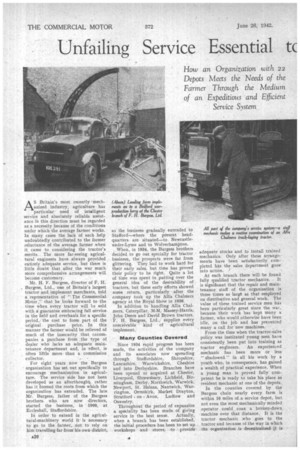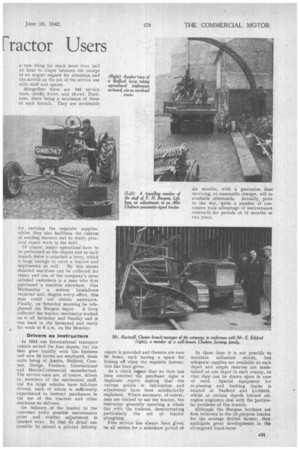Unfailing Service Essential tc Fractor Users
Page 22

Page 23

If you've noticed an error in this article please click here to report it so we can fix it.
AS Britain's most recently 'mechanized industry, agriculture has particular need of intalligent service and absolutely reliable assistance in this direction must be regarded as a necessity because of the conditions under which the average farmer works. In many cases the lack of such _help undoubtedly contributed to the former reluctance of the average farmer when it came to considering the tractor's merits. The more far-seeing agricultural engineers have always provided entirely adequate service, but there is little doubt that after the war much more comprehensive arrangements will become customary.
Mr. H. F. Burgess, director of F. H. Burgess, Ltd., one of Britain's largest tractor and implement merchants, told a representative of " The Commercial Motor," that he looks forward to the time when every tractor will he sold with a guarantee embracing full service in the field and overhauls for a specific period, the cost to form part of the original purchase price. In this manner the farmer would be relieved of much of the insecurity that r.ccompanies a purchase from the type of deader who lacks an adequate maintenance department and, in effect, is often little more than a commission collector.
For eight years now the Burgess organization has set out specifically to encourage mechanization in agriculture. The service side has not been developed as an afterthought, rather has it formed the roots from which the organization has extended. The late Mr. Burgess; father of the Burgess brothers, who are now directors, started the business, in 1900, at Eccleshall, Staffordshire.
In order to extend in the agricultural-machinery world it is necessary to go to the farmer, not to rely on hint travelling far from his own district,
*20 so the business gradually extended to Stafford—where the present• headquarters are situated—to Newcastleunder-Lyme and to Wolverhampton.
When, in 1934, the Burgess brothers decided to go out specially for tractor business, the prospects were far from glittering. They had to work hard for their early sales, but time has proved their policy to be right. Quite a lot of time was spent in putting over the general idea of the desirability of tractors, but these early efforts showed some return, particularly after the company took up the Allis Chalmers agency at the Royal Show in 1936.
In addition to handling Allis Chal.mers, Caterpillar, M-M; Massey-Harris, John Deere and David Brown tractors, F. H. Burgess, Ltd.; supplies every conceivable kind of agricultural implement.
Many Counties Covered Since 1934 rapid progresS has been made, the activities of the company and its associates now spreading through Staffordshire, Shropshire, Lancashire, Warwickshire, Cheshire and into Derbyshire. Branches have been opened or acquired at Chester, Liverpool, Shrewsbury, Lichfield, Birmingham, Derby, Northwich, Warwick, Newport, St. Helens, Nantwich, Warrington, Ormskirk, Market Drayton, Stratford on Avon, Ludlow and Oswestry.
Throughout the period of expansion a speciality has been made of giving service in the best sense. Actually, when a branch has been established, the initial procedure has been to set up workshops and stores, to provide
adequate stocks and to install trained mechanics. Only after these arrange-rnents have been satisfactorily completed Ms the sales department gone' into action.
At each branch there will be found
fully qualified "tractor mechanics. It is significant that the repair and maintenance staff of the organisation is three times as large as that employed on distributive and general work. The value of these trained service men has been particularly great since the war, because their work has kept many a farmer, who would otherwise have been idle, on the job and has prevented. many a call for new machines.
From the time when the tractor-sales policy was instituted young men have consistently been put into training as tractor engineers. An experienced mechanic has been more or less " shadowed" in all his work by a youth who, in consequence, has gained a wealth of practical experience. When a young man is proved fully competent he is ready to take his place as resident mechanic at one of the depots.
In the counties covered by the Burgess chain nearly every farm is within 10 miles of a service depot, but not even the most mechanically minded operator could coax a broken-down machine over that distance. It is the tractor mechanic who goes to the tractor and because of the way in which the organization is decentralized it is
for carrying the requisite supplies, whilst they also facilitate the custom of sending learners out to study practical repair work in the field.
Of course, major operationshave to he performed at the depots and to each branch :there is attached a lorry, which is large enough to carry a tractor and
implements as well. By this means disabled machines can he collected for repair and one of the company's most satisfied customers is a man who first purchased a machine elsewhere. One Wednesday a serious • breakdown occurred and, despite every effort, this man could not obtain assistance. Finally, on Saturday morning he telephoned the Burgess depot. A lorry collected the tractor, mechanics worked on it all Saturday and Sunday and it was back in the farmyard and ready for work at 8 a.m. on the Monday.
Drivers as Instructors In 1934 one International transport vehicle served the four depots, but the fleet grew rapidly with the. business and now 24 lorries are employed, these units being of Austin, Bedford, ComTiler, Dodge, Fordson, International and Morris-Commercial manufacture. The service -vans are, of course, driven by members of the mechanical staff, but the large vehicles have full-time drivers, each of whom is sufficiently experienced to instruct purchasers in the use of the tractors and other machines he delivers.
On delivery of. the tractor to the customer every possible maintenance point and routine adjustment is checked over. So that n9 detail can possibly be missed a printed delivery
report is provided and thereon are over 30 items, each having a space for ticking off when the requisite instruction has been given.
As a check twee that no item has been omitted the purchaser signs a duplicate report stating that the various points in lubrication and adjustment have been satisfactorily explained. Where necessary, of course, men are trained to use the tractor, the instructor generally spending a whole day with the trainees, demonstrating particularly the art of tractor ploughing, , , .
Free service has always been given on all makes for a minimum period of In these days it is not possible to maintain unlimited stocks, but adequate supplies are available at each depot and ample reserves are maintained at one depot in each county, so that they can be drawn upon in case of need. Special equipment for re-pinning and bushing tracks is located at Stafford and Lichfield, whilst at certain depot's trained oilengine engineers deal with the particular problems of this branch.
Although the Burgess brothers are firm believers in the all-purpose tractor for the average British farmer, they anticipate great developments in the oil-engined track-layer.




















































